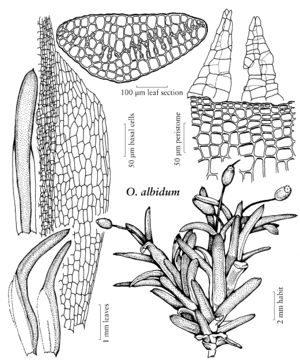Difference between revisions of "Octoblepharum albidum"
Sp. Musc. Frond., 50. 1801,.
FNA>Volume Importer |
imported>Volume Importer |
||
| (6 intermediate revisions by 2 users not shown) | |||
| Line 22: | Line 22: | ||
|elevation=low elevations (0-30 m) | |elevation=low elevations (0-30 m) | ||
|distribution=Fla.;La.;Tex.;pantropical. | |distribution=Fla.;La.;Tex.;pantropical. | ||
| − | |discussion=<p>Octoblepharum albidum is a weedy and conspicuous moss that is distributed worldwide in the tropics. It grows especially on palms, often forming deep soft cushions. The flat, glossy, ligulate, spreading-recurved leaves distinguish it easily in the field from the superficially similar Leucobryum, which has erect or spreading, pointed, subtubulose leaves.</p> | + | |discussion=<p><i>Octoblepharum albidum</i> is a weedy and conspicuous moss that is distributed worldwide in the tropics. It grows especially on palms, often forming deep soft cushions. The flat, glossy, ligulate, spreading-recurved leaves distinguish it easily in the field from the superficially similar <i>Leucobryum</i>, which has erect or spreading, pointed, subtubulose leaves.</p> |
|tables= | |tables= | ||
|references= | |references= | ||
| Line 31: | Line 31: | ||
-->{{#Taxon: | -->{{#Taxon: | ||
name=Octoblepharum albidum | name=Octoblepharum albidum | ||
| − | |||
|authority=Hedwig | |authority=Hedwig | ||
|rank=species | |rank=species | ||
| Line 46: | Line 45: | ||
|publication year= | |publication year= | ||
|special status= | |special status= | ||
| − | |source xml=https:// | + | |source xml=https://bitbucket.org/aafc-mbb/fna-data-curation/src/2e0870ddd59836b60bcf96646a41e87ea5a5943a/coarse_grained_fna_xml/V27/V27_982.xml |
|genus=Octoblepharum | |genus=Octoblepharum | ||
|species=Octoblepharum albidum | |species=Octoblepharum albidum | ||
Latest revision as of 21:29, 5 November 2020
Plants glossy, glaucous-green to white, often with pink tinge; densely cespitose; axillary hairs 3 per axil, 5-celled. Leaves spreading-recurved, fleshy, fragile when dry, 4–5 mm, apiculate, older leaves sometimes with rhizoids on tips. Specialized asexual reproduction rare, by gemmae. Seta yellow, 2–5 mm. Capsule brownish, 1–1.5 mm, ovoid-cylindric, slightly asymmetric, with stomata at base; operculum 0.8 mm; peristome of 8 blunt triangular pairs of teeth, teeth smooth or faintly striate, 200 µm tall, each composed of one interior and one exterior layer of intact, empty, cell-like plates; prostome present. Calyptra 1.5–1.9 mm. Spores finely papillose, 17–24 µm.
Phenology: Capsules mature throughout the year but most common Sep–Apr.
Habitat: Hammocks and open forests, primarily on stems and bases of Quercus virginiana and Sabal palmetto, and rotted logs, occasionally terrestrial on soil and humus
Elevation: low elevations (0-30 m)
Distribution
Fla., La., Tex., pantropical.
Discussion
Octoblepharum albidum is a weedy and conspicuous moss that is distributed worldwide in the tropics. It grows especially on palms, often forming deep soft cushions. The flat, glossy, ligulate, spreading-recurved leaves distinguish it easily in the field from the superficially similar Leucobryum, which has erect or spreading, pointed, subtubulose leaves.
Selected References
None.
